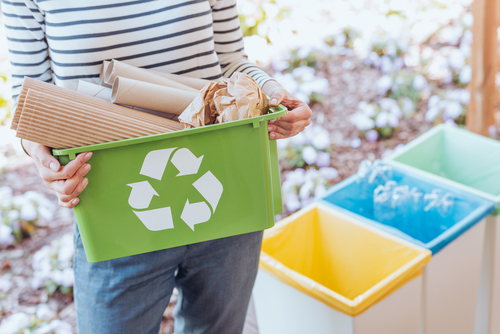Most of us probably don’t think much about how we dispose of waste. Sure, we know we wheel our garbage cans out to the curb every week, but that’s about it. But did you know waste management is one of the most critical industries in the world?
It’s true.
Suppose we’re going to reduce pollution and conserve our natural resources. In that case, we need more organizations that offer clean, reliable waste management solutions. The thing is, these organizations can’t bring us any closer to a zero-waste future without our help.
This means we all need to educate ourselves on all the various ways to dispose of waste without harming the environment.
The Best Ways to Dispose of Waste
Recycling
Recycling is one of the better ways to dispose of waste, but it still has a relatively low adoption rate. The EPA estimates that 75% of waste is recyclable, but we only recycle about 30% of it. We believe the main reason for this isn’t laziness or lack of desire, but a simple lack of knowledge. Most people don’t know which materials can be recycled and where / how to properly dispose of those materials.
Here’s a list of the most common items you can recycle simply by throwing them in your curbside bin. Other things you don’t see listed here, like plastic bags, used electronics, and textiles (garments, towels, bedding, etc.), are also recyclable. However, you’ll have to take them to a local recycling organization:
- Cardboard
- Paper
- Glass
- Empty food boxes
- Beverage cans
- Food cans
- Jars
- Jugs
- Plastic bottles and caps
And here’s a list of things that cannot be recycled:
- Wood
- Light bulbs
- Food waste
- Windows and mirrors
- Plastic toys
- Plastic wrap
- Styrofoam
- Packing peanuts and bubble wrap
Composting
Want to go green? Composting is one of the best, most sustainable ways to dispose of waste. We’re talking about the simple process of recycling organic matter — material like leaves, straw, grass, and vegetables — and turning it into fertilizer.
The main argument for composting is that it decreases greenhouse emissions and makes us all less dependent on landfills. So it’s not harmful for the environment. But there are other great benefits, too, particularly if you have a garden:
- Adding compost to soil makes it ideal for plant growth.
- Plants grown in compost-rich soil are more resilient.
- Vitamins and minerals are recycled back into the ecosystem and absorbed by crops and plants.
- Compost attracts the kind of healthy organisms that are good for soil and plants.
Composting is inexpensive, too! All you need is a space to build your compost pile, and you’re good to go. We recommend a bin with multiple layers, but it isn’t necessary. Simply fill the container or designated area with materials high in nitrogen (think greens like leaves and grass) and materials high in carbon (think browns like straw or wood chippings).
Over the next few weeks and months, your pile will turn into nutrient-rich compost you can return to the earth.
Note: Cold composting takes more time but significantly less work. It requires less turning and management of green-to-brown ratios — just make sure you don’t use diseased plant materials or weeds.
Cities and counties may also offer compost drop off locations for those who collect compost. For example, Dakota County, Minnesota offers multiple locations for organics drop off, such as in Eagan, Mendota Heights, and Burnsville. Dakota County is currently considering adding additional organics recycling drop off locations to its list, including a potential drop off location in Apple Valley.
Furthermore, Aspen Waste provides organics services in Hennepin County, as well as part of commercial and residential services in certain cities.
Reusing
What’s that catchphrase all the kids are saying? “Don’t lose it, reuse it.” It’s memorable for sure, and we have to agree that reusing is a great way to reduce waste.
Every bottle, bag, glass jar, or piece of furniture has to come from somewhere. When these items are made from scratch, it usually involves the process of mining the earth or harvesting trees. By reusing these necessities, you drastically reduce waste and deforestation.
Many even advocate for reusing over recycling. Why? Because it uses less energy and causes little to no pollution.
Aspen Waste Collection Services
At Aspen Waste, we’re dedicated to practicing green trash collection and waste disposal practices. And we want to help others as they search for the best ways to dispose of waste without harming the environment.
Contact us to learn more ways to dispose of waste without harming the environment!
